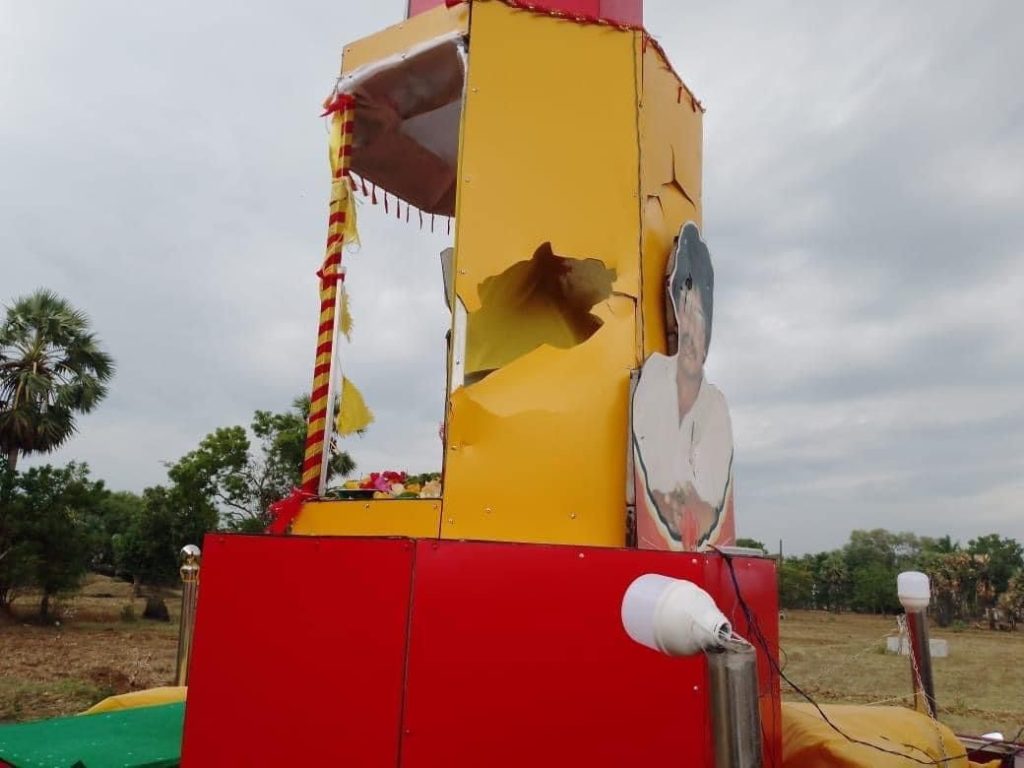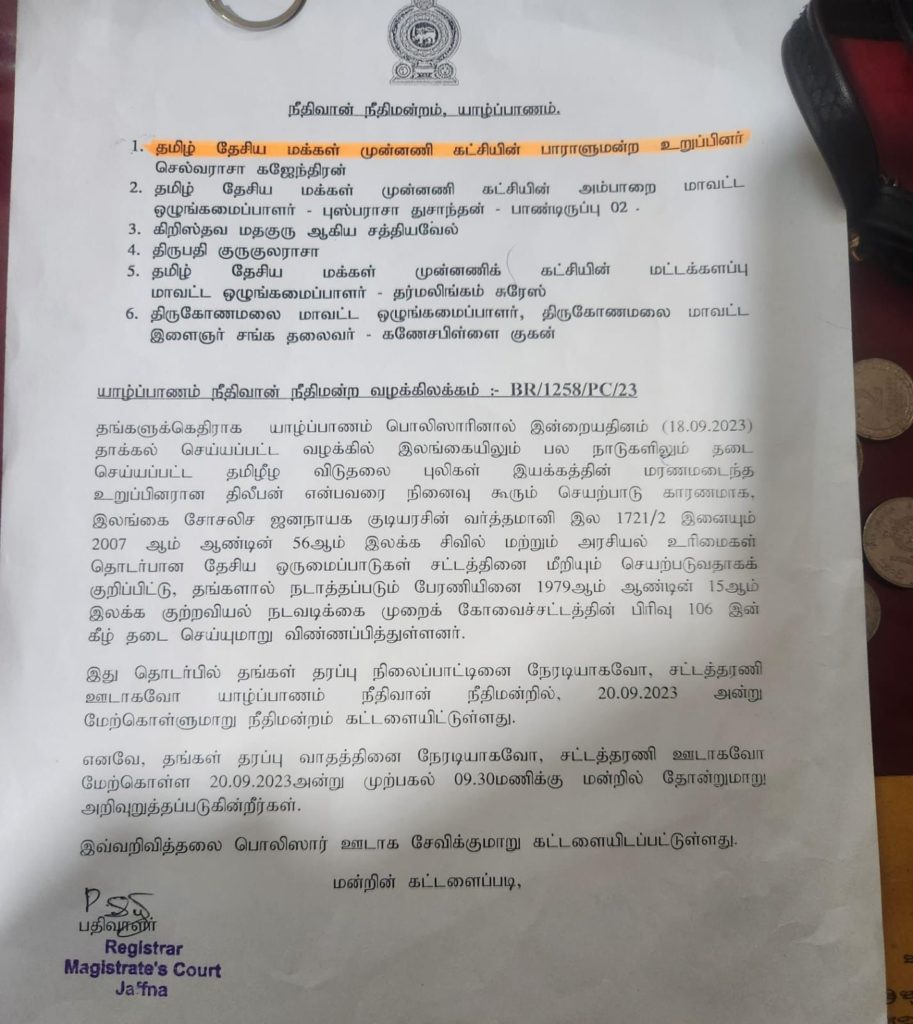Multiple attempts have been made by the Sri Lankan state to suppress the commemoration of Lt. Col. Thileepan. While these ongoing efforts to suppress Tamil people’s right to remember our heroes has been an implicit state policy, it manifests itself overtly during such landmark commemorative events.
Thileepan, a revolutionary figure that led the Jaffna’s political wing of the Liberation Tigers of Tamil Eelam staged a hunger strike to protest the ongoing atrocities perpetrated by the Indian Peace Keeping Force and highlight the Tamil people’s popular demands as to how power should be devolved to bring about the autonomy of the North-East. He began his hunger strike on September 15th, where he refused both food and water, and died of a cardiac arrest on September 26th 1987, after 12 days of holding his fast.
The Tamil National People’s Front initiated a memorial float on September 15th, the first day of Thileepan’s fast, to commemorate the 36th anniversary of his martyrdom. The float began its journey from Pottuvil and intended to travel throughout the North-East to allow people to pay tribute to his sacrifice, and reach Nallur on September 26th. Many people offered flowers and paid their solemn respect to the inspirational figure in contemporary Tamil history.
While people were paying their respects, a mob of Sinhalese thugs violently attacked the float as it was passing through Kappalthurai, Trincomalee on September 17th. Multiple videos surfaced on social media that showed people attacking the image of Thileepan and severely damaged the vehicle on which the float was mounted. TNPF MP Selvaraja Gajendran along with other activists were also injured by the mobs. As it was clearly seen in the videos, this attack took place well within the sight of multiple Police officers and military personnel. Despite this, neither the police nor the military did little to nothing to prevent the violence from happening.
Following this, multiple Police departments have reported the incident to various courts requesting a ban on the commemoration anticipating that other commemorative events will take place within their jurisdictions.
On September 18th the Vavuniya police made a submission at the Vavuniya Magistrate court, claiming that commemoration will invariably disturb the public peace and disrupt racial harmony. At the hearing, the judge dismissed the submission, pointing out that everyone has the right to remember their dead. The court further ruled that it is the duty of the Police to provide security to ensure racial harmony.
On September 19th, the Police stations in Puthukudiyiruppu, Mullaitivu, and Mulliyawalai jointly made a submission at the Mullaitivu Magistrate court, the hearing of which was postponed.
On the same day, the Jaffna Police station made a submission at the Jaffna Magistrate court, alleging that the commemorative event is in contravention of the International Covenant on Civil and Political Rights Act of 2007, and requested an absolute order to ban the commemorative event as an “urgent case of nuisance” in Jaffna, under section 106 of Code of Criminal Procedure. For the hearing on September 20th, the court had summoned TNPF MP Selvaraja Gajendran, TNPF conveners Pushparaja Thushanthan, Dharmalingam Suresh, Ganesapillai Kugan, Rev. Sathiyavel and Mr. Kurukularasa to appear in court.
At the hearing the Police claimed that the events aimed to regroup the LTTE due to the use of yellow and red colours, as they were colours that were associated with the organisation. The Attorney-at-Law defending the events argued that the claim that the usage of these colours constituted a conspiracy to regroup the LTTE was frivolous because these colours are not the images that are proscribed under the law. Following the lack of evidence to further support their claims, the hearing of the case was postponed.
On September 20th, posters inciting hate were also seen in Mannar, ahead of the float arriving in Mannar within the course of the commemoration. The posters by an anonymous group called “Patriotic Tamil People” were seen in many parts of Mannar, including right next to the Mannar Sathosa mass grave. The Posters read “we will chase away the likes of Selvaraja Gajendran of the Tamil National People’s Front, who has commodified the image of Maaveerar Thileepan, who sacrificed his life for Tamil Eelam.”
Despite ownership of the posters being claimed by “Patriotic Tamil People,” it is noteworthy that no such organisation has previously functioned in Mannar. Residents in the area have speculated that the posters were disseminated by either the intelligence officers living in the area, or by people associated with the tri-forces as part of a disinformation campaign to foment hate and violence ahead of the memorial float entering Mannar.
A special team was dispatched by the Attorney General’s office in Colombo that filed yet another submission at the Jaffna Magistrate. The team too, which arrived in Jaffna on September 20th via helicopter, claimed that commemorative events will disrupt racial harmony. In response, during the hearing the next day, the judge emphasised that if any violence were to occur, the Police have the authority to take necessary action to arrest those responsible and ensure that commemorative events take place peacefully.
On September 22nd, the Mallavia and Mankulam Police stations made yet another joint submission at the Mullaitivu Magistrate court, the hearing of which too has been postponed.
These are manifestations of the implicit state policy to suppress the remembrance of anyone that it has not explicitly approved.
As we can see, despite the Court clearly articulating the role of the police as the authority not only to provide security for the commemorative events, but also to take action against those who cause violence. Neither of which it has carried out. The culture of impunity is so deeply embedded within the institution of the Police that it is even extended to those who carry out violent attacks on peaceful commemorations.
Additionally, in a cruel turn of irony, the ICCPR Act, which was designed to protect political rights such as a community’s right to commemorate the dead, is used by the Sri Lankan state to suppress such commemorations. It even carries out disinformation campaigns to instill fear into those who might want to join such commemorative events. The state cannot view itself as anything other than an underdog, a victim, in the face of peaceful commemorations, despite carrying out a military occupation of the North-East. It requires the use of force through mobs and the military intelligence, to whom the impunity of the state is extended, to assert its illegitimate power and hegemonic ideology.
 Eelamurasu Australia Online News Portal
Eelamurasu Australia Online News Portal


